By Final Call News


After the shooting of a 37-year-old Black barber by a rookie police officer in Chicago’s South Shore neighborhood, the police chief released a video within 24 hours of the incident in the name of transparency.
His move brought more questions as the video was without sound, appeared to be edited and was only one video, though several officers, at least four, were involved in stopping Harith Augustus.
Another video has surfaced and raises disturbing questions about a police department in an already explosive situation. Instead of trying to deescalate things, it appears officers recently decided to escalate matters–despite anger, pain and trauma already suffered by Black Chicagoans.

Activist Jedidiah Brown is seen in a video July 19 leading a walking protest across 71st St. and Jeffrey Blvd., a major thoroughfare and trouble spot. In the video, the young activist briefs his companions, saying no one would be arrested. They would simply walk across the street and walk across each intersection in a square, he said.
The walkers moved in accord with traffic lights and did not block traffic.
At a point, the group is approached by a ranking Black officer in a white shirt and keeps walking. Next a gang of police move in and arrest one walker. Jedidiah is grabbed by officers and a brutal beating and takedown follows. It’s hard to understand why it would take 10 officers to control and arrest one Black man armed with a cell phone, especially in a community that has more than its share of real crime.
“They targeted me,” said the activist, who reportedly suffered a broken arm and whose arm was in a cast July 23 during a Facebook Live video. Saying lawyers advised him not to speak much, the activist said he was using a borrowed phone and his phones had been confiscated by police as “evidence.”
“The Chicago Police Department has professionalized violating the civil rights of the Black and the Brown community,” said Jedidiah. “They ain’t heard the last of me,” he vowed. “I am still committed to the fight for justice. I just see now it’s time for some new friends. It’s time for some new voices in this city, and it’s time for people in this city to learn how to be your own voice. Because they trying to take out the voices that are loud that will not compromise, but if everybody had their own voice they would never silence our community.”
The brutality in the video is clear but more importantly, what was its intent? Was the vicious handling of this young man a sign of what Blacks can expect from those who are supposed to serve and protect?
Instead of acting as peacemakers, members of the Chicago Police Dept., with its history of torture and corruption, conducted themselves as an occupying army in this Black neighborhood.
Such abuses and political failures to rein in cops are bringing the country closer and closer to an explosion and helping cities into financial ruin. “As the costs of police misconduct rise, cities and counties across the United States are going into debt to pay for it. Often this debt is in the form of bond borrowing. When cities or counties issue bonds to pay these costs, banks and other firms collect fees for the services they provide, and investors collect interest. The use of bonds to pay for settlements and judgments greatly increases the burden of policing costs on taxpayers, while producing a profit for banks and investors. Using bonds to pay for settlements or judgments can nearly double the costs of the original settlement,” observed the Action Center on Race & the Economy, in a recent report, “Police Brutality Bonds.” (See story page 2.)
The bigger cost is seething anger felt in the hearts of Blacks tired of being victimized. And with the trial of police officer Jason Van Dyke, who pumped 16 shots into a Black teenager two years ago, coming Sept. 5, 2018, the city is already on edge. Mr. Van Dyke is charged with the first-degree murder of 17-year-old Laquan McDonald.
Each ugly and unjustified incident heralds a potentially cataclysmic clash between the police and the policed.
“It’s sad that the police can try to, have the ability to, to lighten the hand or make the hand heavy, if we will,” commented Nkrumah English of the Black United Fund of Illinois, a mainstay institution in South Shore. “ ‘Well we’ll lighten it because we know our officers were bogus in their approach and handling of Brother Augustus. So we’ll let them do this march now and we’ll be light-handed on this. Ok. We’re tired and here is a regular face that we see that’s always been an activist and so-called antagonist. We going to do something about him.’
“I think the Jedidiah Brown thing was a bit of the past and bit of ‘and now we’re going to let them see how we act.’ So when they come out here again, they’ll know we might be bustin’ heads,” he said. “And I think that’s the culture of the police all the way from the Hill St. Blues days. What was their title thing? ‘Let’s go out and bust some heads.’ They still have that mentality and we have to adjust their mentality and we adjust their mentality through unification.”
Chicago clearly has a policing crisis and apparently little desire to make true change. Unity is critical in an hour like this, when we may find we have no one to depend on but ourselves.












